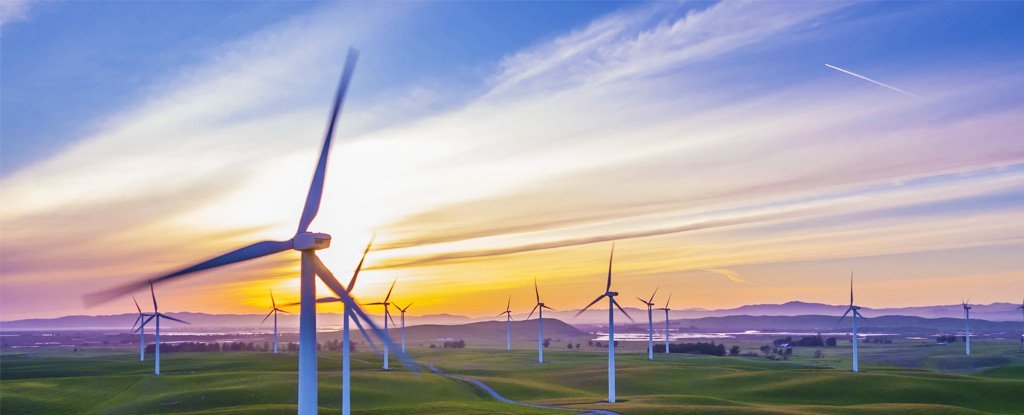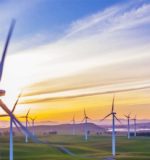Renewable energy could power an economic recovery from COVID-19 by spurring global GDP gains of almost US$100 trillion (£80 trillion) between now and 2050, according to a report.
The International Renewable Energy Agency found that accelerating investment in renewable energy could generate huge economic benefits while helping to tackle the global climate emergency.
The agency’s director general, Francesco La Camera, said the global crisis ignited by the coronavirus outbreak exposed “the deep vulnerabilities of the current system” and urged governments to invest in renewable energy to kickstart economic growth and help meet climate targets.
The agency’s landmark report found that accelerating investment in renewable energy would help tackle the climate crisis and would in effect pay for itself.
Investing in renewable energy would deliver global GDP gains of US$98 trillion above a business-as-usual scenario by 2050 by returning between US$3 and $8 on every dollar invested.
It would also quadruple the number of jobs in the sector to 42 million over the next 30 years, and measurably improve global health and welfare scores, according to the report.
“Governments are facing a difficult task of bringing the health emergency under control while introducing major stimulus and recovery measures,” La Camera said.

“By accelerating renewables and making the energy transition an integral part of the wider recovery, governments can achieve multiple economic and social objectives in the pursuit of a resilient future that leaves nobody behind.”
The report also found that renewable energy could curb the rise in global temperatures by helping to reduce the energy industry’s carbon dioxide emissions by 70 percent by 2050 by replacing fossil fuels.
Renewables could play a greater role in cutting carbon emissions from heavy industry and transport to reach virtually zero emissions by 2050, particularly by investing in green hydrogen.
The clean-burning fuel, which can replace the fossil fuel gas in steel and cement making, could be made by using vast amounts of clean electricity to split water into hydrogen and oxygen elements.
Andrew Steer, chief executive of the World Resources Institute, said: “As the world looks to recover from the current health and economic crises, we face a choice: we can pursue a modern, clean, healthy energy system, or we can go back to the old, polluting ways of doing business. We must choose the former.”
The call for a green economic recovery from the coronavirus crisis comes after a warning from Fatih Birol, head of the International Energy Agency, that government policies must be put in place to avoid an investment hiatus in the energy transition.
“We should not allow today’s crisis to compromise the clean energy transition,” he said. “We have an important window of opportunity.”
Ignacio Galán, the chairman and CEO of the Spanish renewables giant Iberdrola, which owns Scottish Power, said the company would continue to invest billions in renewable energy as well as electricity networks and batteries to help integrate clean energy in the electricity.
“A green recovery is essential as we emerge from the COVID-19 crisis. The world will benefit economically, environmentally and socially by focusing on clean energy,” he said.
“Aligning economic stimulus and policy packages with climate goals is crucial for a long-term viable and healthy economy.”








 Photographer Finds Locations Of 1960s Postcards To See How They Look Today, And The Difference Is Unbelievable
Photographer Finds Locations Of 1960s Postcards To See How They Look Today, And The Difference Is Unbelievable  Hij zet 3 IKEA kastjes tegen elkaar aan en maakt dit voor zijn vrouw…Wat een gaaf resultaat!!
Hij zet 3 IKEA kastjes tegen elkaar aan en maakt dit voor zijn vrouw…Wat een gaaf resultaat!!  Scientists Discover 512-Year-Old Shark, Which Would Be The Oldest Living Vertebrate On The Planet
Scientists Discover 512-Year-Old Shark, Which Would Be The Oldest Living Vertebrate On The Planet  Hus til salg er kun 22 kvadratmeter – men vent til du ser det indvendigt
Hus til salg er kun 22 kvadratmeter – men vent til du ser det indvendigt  Superknepet – så blir snuskiga ugnsformen som ny igen!
Superknepet – så blir snuskiga ugnsformen som ny igen!  Meteorite That Recently Fell in Somalia Turns Out to Contain Two Minerals Never Before Seen on Earth
Meteorite That Recently Fell in Somalia Turns Out to Contain Two Minerals Never Before Seen on Earth  Nearly Frozen Waves Captured On Camera By Nantucket Photographer
Nearly Frozen Waves Captured On Camera By Nantucket Photographer  It’s Official: Astronomers Have Discovered another Earth
It’s Official: Astronomers Have Discovered another Earth 